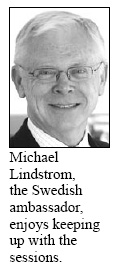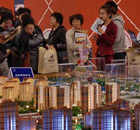Hot on the Web
Economy, climate policy concern foreigners
By Ai Yang and Cheng Guangjin (China Daily)
Updated: 2010-03-01 08:47
 |
Large Medium Small |

BEIJING: China's future role in the global economy and on climate change issues are the chief concerns among foreigners living in Beijing ahead of the annual sessions of National People's Congress (NPC) and the Chinese People's Political Consultative Conference (CPPCC).
The Third Sessions of the 11th CPPCC National Committee, the top advisory body, and the 11th NPC, the top legislature, are scheduled to open on March 3 and March 5, respectively.
Looking forward to participating in the opening events, Swedish Ambassador Michael Lindstrom told China Daily he sees it as "a very important diplomatic occasion of the year."
"We are interested to know China's major future economic policies as the world is dealing with the aftermath of the global financial crisis, and China's policies and decision for its development," Lindstrom said.
Lindstrom, who has been based in China for years, said he has been able to keep abreast of the important items discussed during the conferences.
Shortly after the global financial crisis took root in September 2008, China announced a 4-trillion-yuan ($585.7 billion) stimulus package, and pledged to shift its fiscal policy from "prudent" to "proactive" and the monetary policy from "tight" to "moderately loose".
"China has become a very significant global player and an emerging economic giant that the world expects much from, particularly Africa and other developing countries," said Arab Auta Yadam, an official at the Embassy of the Federal Republic of Nigeria.
Noting that China's foreign reserves portfolio had breached $2.3 trillion, Yadam said he hoped the upcoming two sessions could show "how China can translate this into an advantage by deploying some of it in its foreign policy pursuits."
Yadam also suggested "improvement in bilateral relations through the provision of development assistance, which will in turn create good-will for China."
"As an emerging, powerful global power China cannot afford to ignore the rest of the world's expectations of her - that is, purposeful leadership that the rest of the world will trust and have confidence in. China's history and present economic position have entrusted this inevitable role on her, which she must grasp," Yamda said.
The Copenhagen climate change summit in December marked yet another milestone for China in the past year.
China, one of the biggest greenhouse gas emitters, is expected to "unveil new policies and measures on the environment issue soon," said Inger Bentzrud, a correspondent in Beijing with the Norwegian newspaper Dagbladet.
"I'm keen to see China's low carbon development and economic transformation, as well as how China will realize its promise to the international community in terms of environment protection," said Zhang Jianyu, program manager with the US-based Environmental Defense Fund.
Along with broad policy issues, foreigners living in China also expressed some practical concerns ahead of the two sessions.
James Jao, president of Long On Group, hoped foreigners residing in China would be given more employment guarantees. Highly skilled foreign workers working in specialized fields should be given more than temporary stay permits in China, he said.
"I realize this is not going to be solved overnight but the issue should enter into some kind of discussion now," Jao said.
The rising cost of housing too was worrying the foreigners.
"The Chinese housing market needs a comprehensive policy so that the urban poor will not pour out their frustrations on the government," Jao said.







